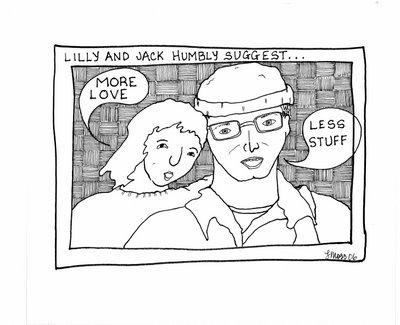Propaganda
I received an e-mail last week through the school library system that made my blood run cold. A couple of years ago, I would have thought nothing of it. Now I recognized it for what it was: propaganda.
The e-mail comes, ostensibly, from my professional organization, the American Library Association. It urges libraries “as community leaders—to take charge of making sure their communities are prepared in the event of an emergency or disaster.” For more information, librarians are encouraged to visit the website of the “Ready Campaign,” maintained "as a public service" by the Department of Homeland Security and the Ad Council.
The Department of Homeland Security I don’t have to explain to you, but the Ad Council, which puts itself forward as the public service arm of the advertising profession, has been providing the government with high quality propaganda since its inception in 1942 with its earliest offerings in the war propaganda effort.
In fact, the government of the United States, which makes a point of telling the world that it does not use propaganda, and insists that it intentionally tells only the truth to the American people and to the people of the world, not only uses propaganda, but has perfected propaganda into a uniquely powerful twenty-first century form.
 The book I’m reading now, Total Cold War: Eisenhower's Secret Propaganda Battle At Home and Abroad, by Kenneth Osgood, is a thorough and stunningly researched exploration of the evolution of propaganda into total psychological warfare. Some quotes from the book:
The book I’m reading now, Total Cold War: Eisenhower's Secret Propaganda Battle At Home and Abroad, by Kenneth Osgood, is a thorough and stunningly researched exploration of the evolution of propaganda into total psychological warfare. Some quotes from the book:This quote refers to anti-nationalist propaganda, intended to dissolve the will of the people of other countries to create their own cultural identity: “Pointedly highlighting the economic stakes involved, the NSC [National Security Council] noted that ‘in some countries . . . nationalism expresses itself strongly against proposals for the development of natural resources, especially petroleum, by U.S. private capital.’” (p. 144). In fact, (now this is my opinion, not that of the author) the development of natural resources by U.S. private capital amounts to the plunder of the rainforests, metals, labor, and raw materials of that country for the benefit of corporate wealth. To protect access for the purposes of plunder, we engaged in psychological warfare against many countries during the 1950s, most notably in Latin America.
“American psychological operations abroad functioned both as weapons of political warfare and tools of empire . . . political warfare came to mean the use of all available means to influence the political, economic, strategic, and psychological orientation of foreign countries.” (p. 149). This, to me, reveals the global imperial intentions of the United States. Instead of controlling the world and its people and resources through violence and military victory, or even though political domination, the battle is now played on the field of culture and mind. The world belongs to the ones who can control our consensual reality, our culture and beliefs.
“Ordinary Americans also were encouraged to actively contribute to the propaganda campaign, making them both targets and participants. The Eisenhower administration’s sophisticated approach to information management made the subtle manipulation virtually invisible to taget audiences and to journalists who were (actively or unconsciously) agents of domestic propaganda.” (p. 178) The increasing sophistication of the machinery of mind-control made propaganda more invisible and effective than ever. That capability is continuing to increase today, with enhanced communications capabilities, faster and better information technologies, and a practiced understanding of psychological and cognitive processes and how to manipulate them. Propaganda is more insideous, prevelant, and effective than ever before, both domestically and internationally.
 Atoms for Peace was a hugely successful propaganda campaign that countered public fear of the bomb and enabled the United States to continue to finance and stockpile its cache of nuclear weapons.
Atoms for Peace was a hugely successful propaganda campaign that countered public fear of the bomb and enabled the United States to continue to finance and stockpile its cache of nuclear weapons.Another frightening realization from Total Cold War is that the perpetrators of psychological warfare are aware of the spiritual dimensions of culture and mind control. A “basic truth,” wrote President Eisenhower, is that “humans are spiritual beings; they respond to sentiment and emotions as well as to statistics and logic.” (quoted on p. 54). In 1956, Henry Kissinger wrote that diplomatic efforts had become struggles, not to negotiate, but “to capture the symbols which move humanity.” (quoted on p. 183).
It’s worth doing a bit of research to learn more about propaganda. Key issues include the use of disguise as education, news, or science, and the ability to create events that become news. Osgood contends that the increase in the power of public opinion and better media were the two principle reasons for the upsurge in propaganda during the Cold War. I would add a number of other factors, such as better understanding of psychological and cognitive processes, the success of advertising and marketing, the increasing world resistence to the use of force, and the global increase in literacy.
As for my e-mail from the ALA, I can only shake my head sadly. They would have me believe that my community is in danger. Why? Who is putting us in danger? They are telling me that I should be afraid, I should prepare for the worst. John Foster Dulles, Eisenhower’s Secretary of State, declared in 1955 that “fear and moral superiority have been the cement which has held the free world together.” What would the dominators do if there was no fear left to exploit?
Thanks for your patience with this long post.
Best wishes,
Lilly
Some relevant links
ThinkQuest: Propaganda Techniques
Public Dimplomacy and Covert Propaganda
Center for Media and Democracy
Democracy Now: State Propaganda



